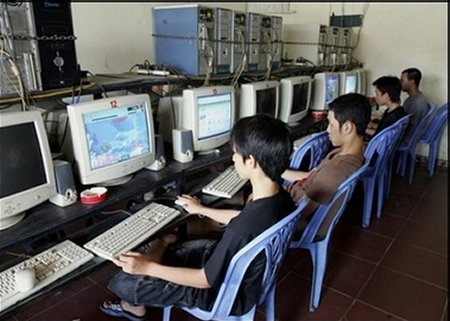New Decree Prohibits Online Criticism of Lao Government Policies
Laos has issued a new law prohibiting online criticism of the government and the ruling communist party, according to state media, setting out stiff penalties for netizens and Internet service providers who violate controls.
Last week, Lao Prime Minister Thongsing Thammavong signed Decree No. 327 into law “to monitor and prevent … information deemed threatening [to] society and national security,” according to the official Lao News Agency (KPL).
The 28-point decree makes Laos the latest Southeast Asian country to implement tough new laws governing use of the Internet.
Under the decree, which will take effect on Oct. 1, netizens will face criminal charges for publishing “untrue information” about policies of the ruling Lao People’s Revolutionary Party or the Lao government for the purpose of “undermining … the country.”
Netizens found to be disseminating content encouraging terrorism and social disorder, or which is deemed to “divide the solidarity among ethnic groups and between countries,” will also face charges, KPL said, adding that “national secrets” are also prohibited from being circulated.
Pornography and “inappropriate photos” are banned from online publication, as well as “photos that contradict Lao traditions and culture” and images that violate intellectual property rights.
The decree also requires netizens to use their real names when setting up social media and other accounts online.
Any Internet service provider determined to be “making available conditions or facilitating” actions aimed at tarnishing party or government policies would also face legal action, the report said.
Those committing “minor” violations of the decree would receive a warning, it said, while those involved in “serious infringements” will be “disciplined, fined or subject to civil or criminal charges.”
According to the official Vientiane Times, the government decided to issue the decree after authorities “learnt that many users have used the Internet in negative ways,” including circulating “false information” as well as “inappropriate photos” through social media such as Facebook.
The move also comes amid economic growth in Laos which has seen cell phone and Internet usage rates grow in recent years as the impoverished country slowly develops.
Netizens react
In Laos, social media reaction to the new decree was largely negative, with many users commenting that articles in the law were too vague.
One anonymous commenter welcomed the new measures, saying that they would bring order to social media services like Facebook and would prevent Internet users from “creating divisions within society.”
“Netizens use the Internet for political purposes more than anything else,” he wrote.
“If it is related to analysis or comments, it is good, but [the Internet] is also used for insulting people. It must be controlled according to law.”
But another commenter suggested the decree was so broad that a majority of Internet users would face charges for violating it in one way or another, while many Internet service providers would be forced to shut down.
“If the decree is truly enforced, there will be no empty cells in the jails for the offenders,” the commenter wrote. “Putting the whole population in jail is not something that can be done.” A third commenter said that the Internet restrictions were akin to “tying the arms” of journalists to prevent them from reporting the truth.
He noted that imposing controls on the Internet is in direct conflict with the country’s media law, which safeguards the rights of reporters to accurately cover the news.
Observers say that while the decree may seek to control the use of the Internet, there is likely to be no immediate effect on usage as the government lacks experienced working units to scrutinize online content, though that may change over time.
In the meantime, they say, the decree may simply be aimed at intimidating Internet users, in much the same way earlier decrees banning illegal logging or ordering state employees to declare their assets have done, without proper enforcement.
Neighborly influence
Reports have suggested that Laos may have received advice about how to control online media from its neighbor Vietnam, which in September last year introduced Decree No. 72—a set of similar restrictions on Web usage which drew condemnation from global Internet firms.
Vietnam has jailed dozens of activists amid a crackdown on online dissent that has intensified over the past four years, convicting many of them under vaguely worded national security provisions, according to rights groups.
The Lao Communist Party leadership, which has ruled the country with an iron fist since 1975, has long enforced strict controls on broadcast and print media in the country, where only about 8 percent of the population has access to the Internet.
However, social media use has become increasingly prominent in Laos in recent years, especially among the younger population.
There has been a large jump in the number of Facebook users, from 200,000 users in 2012 to 530,000 as of May this year, 82 percent of whom are under 30 years old, according to Keovisouk Solaphom, acting director-general of the Lao National Internet Centre.
Source: RFA

